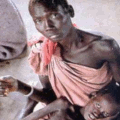354 - El sueño de los estómagos vacíos
||||Mägen|
354 - The dream of empty stomachs
354 - O sonho dos estômagos vazios
LOCUTORA Pumapi y sus cinco hermanos son huérfanos.
|Pumapi||||||
ANNOUNCER Pumapi and his five brothers are orphans.
Mientras comen una ración de frijoles, lamiéndose los dedos del índice al pulgar, trazan el plan del día.
|||Portion|||sich leckend||||Zeigefinger||Daumen|zeichnen||||
|||ration|||licking||fingers|of the||||they outline||||
As they eat a serving of beans, licking their index fingers at the thumb, they map out the plan for the day.
JOVEN Pedir limosna.
||Almosen
YOUNG MAN Asking for alms.
Tal vez consigamos algo.
||wir bekommen|
||we get|
Maybe we can get something.
LOCUTORA Sólo tienen una barraca en un campo baldío donde crece la sequedad y la muerte.
||||Hütte||||Brachland||||Trockenheit|||der Tod
|Only|||shack||||barren|||||||
ANNOUNCER They only have a barrack in a vacant field where dryness and death grow.
Hace un año, sus padres murieron víctimas del SIDA.
|||||starben|Opfer|des|AIDS
A year ago, her parents died of AIDS.
LOCUTOR Los tres hijos de la abuela Dlamini murieron.
|||||||Dlamini|
ANNOUNCER Grandma Dlamini's three children died.
El primero, de unas fiebres malas.
||||Fieber|schlecht
||of||fevers|
The first, of bad fevers.
Los otros dos, asesinados en las minas de Sudáfrica.
|||ermordet|||Bergwerke||
The other two, murdered in the mines of South Africa.
Ella quedó a cargo del hambre de sus 18 nietos.
||||||||Enkelkinder
She was left in charge of the hunger of her 18 grandchildren.
ANCIANA El saco de maíz que nos dio el gobierno ya se acabó.
||||Mais||||||||
ANCIANA The bag of corn that the government gave us is over.
Tenemos unas gallinitas, pero no las podemos comer porque nos dan huevos.
||Hühner|||||||||
||hens|||||||||
We have little hens, but we can not eat them because they give us eggs.
LOCUTORA Ncamiso y su hermano menor juegan en unos columpios oxidados.
|Ncamiso||||||||Schaukeln|verrosteten
|||||||||swings|rusty
ANNOUNCER Ncamiso and his younger brother are playing on rusty swings.
LOCUTOR De mañana, pastorean sus vacas para luego ir a la escuela donde aprenden unas pocas letras y números.
|||weiden|||||||||||||||
|||they graze|||||||||||||||
ANNOUNCER Tomorrow, they graze their cows and then go to school where they learn a few letters and numbers.
LOCUTORA No conocen la carne ni la leche.
SPEAKER They do not know meat or milk.
Sus vacas están tan secas como la tierra que les rodea.
||||||||||umgibt
||||||||that||
Their cows are as dry as the earth around them.
LOCUTOR Esta es la vida diaria de 250 millones de africanos y africanas.
|||||||||Afrikaner||
|||||daily||||||
LOCUTORA Las cifras del hambre son estremecedoras.
||Zahlen||||erschreckend
||||||harrowing
ANNOUNCER The hunger figures are shocking.
LOCUTOR En Malawi, la hambruna se hace crónica para la tercera parte de la población.
||Malawi|||||chronisch|||||||
||||famine||||||||||
ANNOUNCER In Malawi, famine is chronic for a third of the population.
LOCUTORA En Zambia, la mitad del país sufre desnutrición.
||Sambia|||||leidet|Unterernährung
|||||||suffers|
ANNOUNCER In Zambia, half the country suffers from malnutrition.
LOCUTOR En Namibia, Mozambique y Angola, millones de seres humanos viven en pobreza extrema.
||Namibia|Mosambik||Angola|||||||Armut|extremar
LOCUTORA Tanzania, Kenia, Etiopía y Somalia, países que fueron cuna de la humanidad, soportan hambrunas cada año.
|Tansania||Äthiopien||Somalia||||Wiege||||ertragen|Hungersnöte||
|||||||||cradle||||suffer|famines||
ANNOUNCER Tanzania, Kenya, Ethiopia and Somalia, countries that were the cradle of humanity, endure famines every year.
LOCUTOR La histórica colonización del continente, la corrupción, la sequía y el SIDA explican la mortandad africana.
||historische|Kolonisierung|des|||Korruption||Dürre||||erklären||Sterblichkeit|
|||colonization||||||||||explain||mortality|
ANNOUNCER The historical colonization of the continent, corruption, drought and AIDS explain the African mortality.
LOCUTORA Alrededor de 850 millones de personas, uno de cada ocho habitantes del planeta, sufren hambre crónica.
|||||||||||||leiden||
ANNOUNCER Around 850 million people, one in eight inhabitants of the planet, suffer from chronic hunger.
LOCUTOR Pero en África este porcentaje aumenta.
Uno de cada cuatro africanos y africanas sufre hambre.
LOCUTORA El hambre: el peor de los terrorismos.
||||||der|Terrorismus
|||||||terrorisms
ANNOUNCER Hunger: the worst of terrorism.
LOCUTOR Y LOCUTORA Los terroristas tienen nombre: son banqueros, terratenientes, fabricantes de armas, dueños de farmacéuticas, millonarios y multimillonarios, los que aparecen en la lista de Forbes, los de la “riqueza extrema”, los que acaparan todo mientras otros seres humanos no tienen nada.
||||Terroristen||||Banker|||||Eigentümer||Pharmaunternehmen|||Multimillionäre|||erscheinen|||||Forbes||||||||akquirieren||||||||
|||||||||||||||pharmaceuticals|||multimillionaires||||||||||||||||||||||||
ANNOUNCER AND ANNOUNCER Terrorists have names: they are bankers, landowners, arms manufacturers, pharmaceutical owners, millionaires and billionaires, those who appear on the Forbes list, those of "extreme wealth", those who hoard everything while other human beings they have nothing.
ABUELA Siempre lo mismo.
GRANDMA Always the same.
Sueño con comida.
I dream of food.
Después, duele despertar.
||aufwachen
Afterwards, it hurts to wake up.
LOCUTORA Es el sueño de millones de estómagos vacíos.
La ilusión de comer, de llevarse algo a la boca.
|Illusion||||sich nehmen||||
|||||||||mouth
The illusion of eating, of putting something in your mouth.

